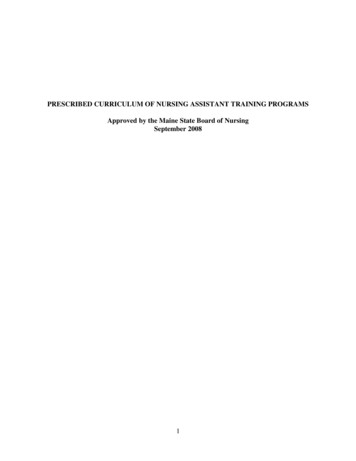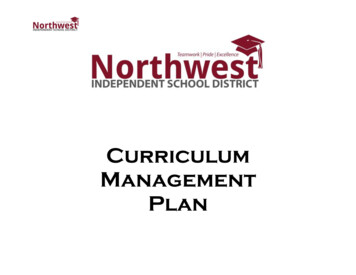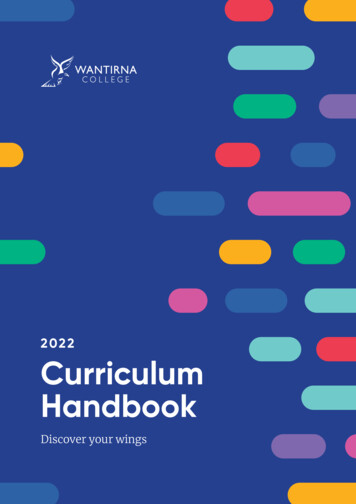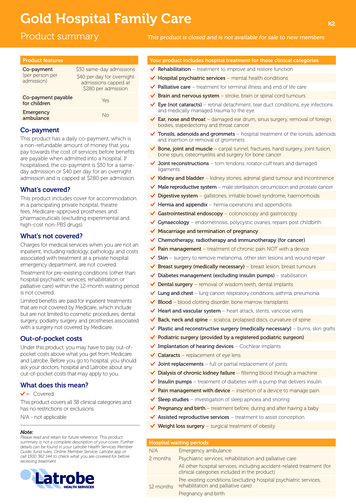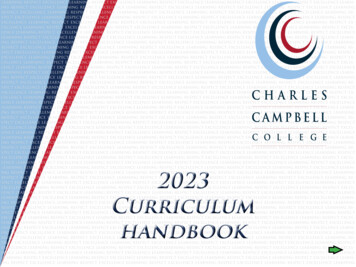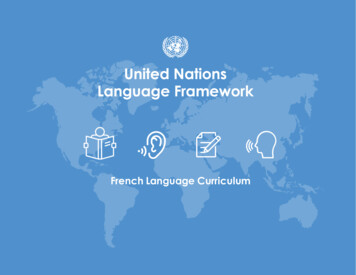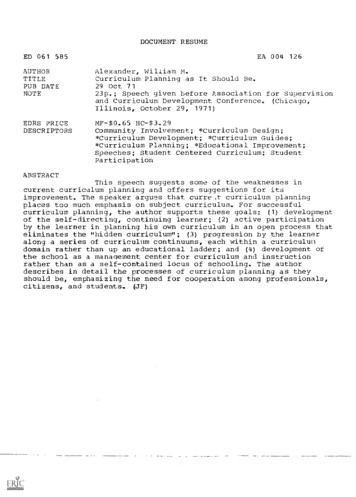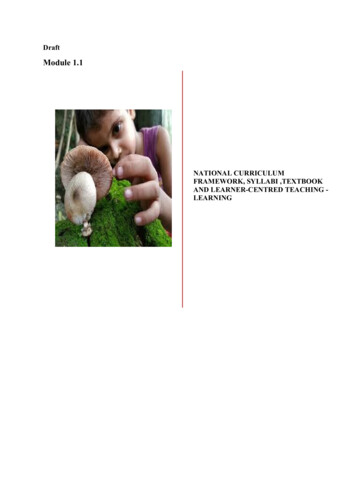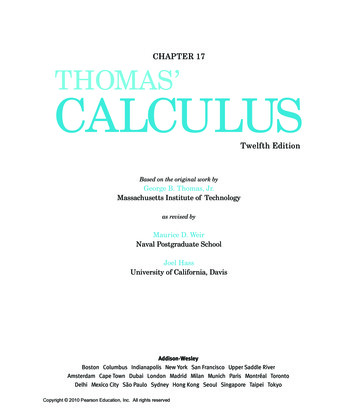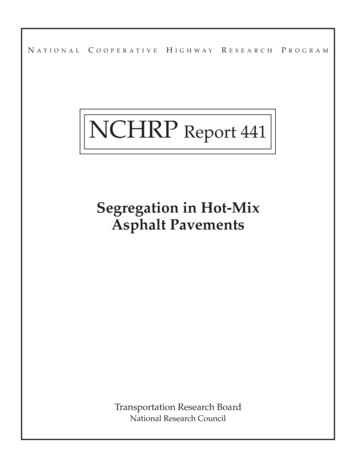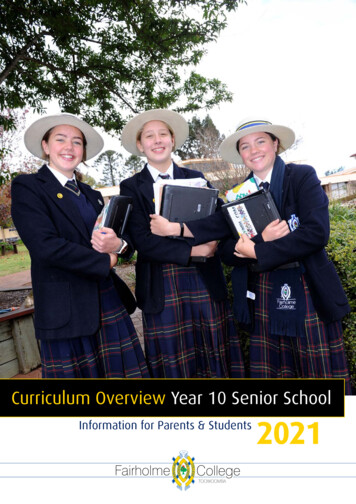
Transcription
Curriculum Overview Year 10 Senior SchoolInformation for Parents & StudentsFairholmeCollegeTOOWOOMBA2021
KEY STAFFHead of Senior SchoolMs C SharpHead of Teaching and LearningMr S PeacockDanceMrs B ChoiceDesign and Technologies (Food and Fibre)Mrs M-J MeiseDramaMs N MacksEnglishMr R DavisHealth and Physical EducationMrs N WilliamsHumanitiesMs K ScudamoreInformation TechnologyMr C ChucLanguagesMrs J FriendMarketing and OpportunitiesMrs K MaherMathematicsDr C HillMusicMr A DixonPerformance MusicMr A DixonScienceMrs F BrazierSportMr T TregaskisThe Greta CentreMs L HobsonVisual ArtMrs K HaywardLearning PathwaysMiss A HollindaleLearning EnhancementMrs K WallisCareers SpecialistMrs L AndersonT 07 4688 4688F 07 4688 4694E egistered Provider (Queensland): Fairholme College ToowoombaCRICOS Provider Code: 03726DABN: 16 917 099 0532Year 10 SENIOR SCHOOL Curriculum Overview
INTRODUCTIONDear Parents and Students,The Senior School Year 10 Curriculum overview aims to provide parents and students with informationthat relates to the courses offered by Fairholme College in Year 10. The variety of subjects offered atthe College in the Middle School should enable students to have experienced a broad educationalexperience enabling them to make informed decisions as to which subjects they would like to pursuefurther. As you read this Overview you will note that Fairholme College maintains an extensive rangeof subject options in preparation for the new senior assessment and tertiary entrance systems.The new systems include: A model that uses both school-based assessment and common external assessmentProcesses that strengthen the quality and comparability of school-based assessmentA move away from the Overall Position (OP) to an Australian Tertiary Admission Rank (ATAR)In line with the QCAA requirements Year 10 students will be required to undertake a Senior EducationTraining (SET) Plan, where by parents, students and a member of the Senior SET Plan Team meet tobegin to formulate each student’s individual plan for her educational journey. For Boarder families thisinterview can be conducted by phone if necessary.This SET Plan meeting will include the opportunity to discuss the selection of subjects in line withthe new systems described above and the various pathways to University entry, as well as the abilityto fulfil the requirements to gain a Queensland Certificate of Education (QCE). (Further detailedinformation on the QCE and changes to senior assessment and tertiary entrance can be found on theQCAA website https://www.qcaa.qld.edu.au/)Please do not hesitate to contact my office should you require any further information on thisimportant time in your daughter’s educational journey.I wish your daughter every success in her studies.Mr Stewart Peacock Head of Teaching and Learning3Year 10 SENIOR SCHOOL Curriculum Overview
PROCEDURES FOR SELECTIONOF SUBJECTS1.3.2.4.Students in Year 10 are required to nominate their final SeniorSubject preferences online toward the end of Year 10 (for continuingstudents) after discussion with parents/guardians.Students will then be allocated subjects on the basis of the subjectlines created and their submitted preferences.When choosing subjects for Years 11 and 12, students and parentsshould be guided by the SET Plan interview, future career aspirationsand the subjects the student enjoys.All students are required to be enrolled in six subjects at the outset ofYear 11.QUEENSLAND’S SYSTEM OF SENIOR ASSESSMENTAND TERTIARY ENTRANCE SYSTEMThe Queensland Government has introduced new seniorassessment and tertiary entrance systems from 2019. Thepurpose is to improve the Queensland Certificate of Education,thereby giving students more opportunities for success afterYear 12. WHAT IS DIFFERENT ABOUT THE NEW SYSTEM? A model that uses both school-based assessment and commonexternal assessmentProcesses that strengthen the quality and comparability ofschool-based assessmentA move away from the Overall Position (OP) to an AustralianTertiary Admission Rank (ATAR)The ATAR is a finer-grained rank order than the OP and iscommonly used in other states and territories. It is a numberbetween 0.00 and 99.95, with increments of 0.05, whereas theOP consists of 25 bands. ASSESSMENT CHANGES AUSTRALIAN TERTIARY ADMISSION RANK (ATAR) 4ATARs will be calculated by the Queensland Tertiary AdmissionsCentre (QTAC)Students must satisfactorily complete an English subject (Soundachievement) to be ATAR-eligible.ATARs will be calculated from a student’s best five (5) subjectresults, one of which may be:- A completed VET qualification at a Diploma, CertificateIV or III level- An Applied subject resultATARs will be calculated by comparing student results and therewill be a process of inter-subject scaling. Scaling is necessaryso that student results in different types of subjects can becompared.Year 10 SENIOR SCHOOL Curriculum OverviewIn the new system, subject results are based on a student’sachievement in three school based assessments and oneexternal assessment that is set and marked by the QueenslandCurriculum and Assessment Authority (QCAA).External assessment results contribute 25% towards a student’sresult in most subjects. In mathematics and science subjects,it will generally contribute 50%. The school-based results willnot be scaled by the results of the external assessment whencalculating a student’s subject result.Students will receive a numerical as well as A-E final subjectresult.
Queensland Certificate of Education (QCE)The Queensland Certificate of Education (QCE) isQueensland’s senior school qualification. It is awardedto eligible students (usually at the end of Year 12) by theQueensland Curriculum and Assessment Authority. (QCAA)The requirements for a QCE are different to those for tertiaryentrance. A QCE does not give you an Australian Tertiary AdmissionRank (ATAR). An ATAR is a statewide rank that is used for tertiaryentrance only.4.Greatest number of future career options. It is advisable that youdo not choose too narrow a range of subjects as this may restrictyour career options. The evolution of new job categories and thehigh level of competition for tertiary places make it sensible tokeep your options open. It is the College’s experience that manystudents in Years 10 and 11 are not ready to make a definitecareer choice and should not unnecessarily lock themselves intoa narrow pathway.5.Balance of subjects. Not all of your subject choices need to relatedirectly to your career path, although future career optionsmust weigh heavily in any subject choice. Consider a balance ofsubjects drawn from at least one of the Sciences, Humanities,Commerce and Creative areas to ensure enjoyable Senior yearsof study and growth as a rounded individual with the skills,knowledge and attitudes for future life.QCE subjectsTo be awarded a QCE you must complete a minimum of 20 creditpoints from a combination of coursesincluding: core—senior school subjects most students study, and VETCertificate II, III, IV levels preparatory—can include some VET courses at a certificate Ilevel enrichment—courses that develop high level skills andknowledge in a specific area advanced—can include university courses and diploma oradvance diploma programsYou should also aim to balance your life at school with a carefullyplanned selection of vocational choices and/or co- curricularinvolvement. It is the College’s experience that the most successfulstudents are those who are busily involved in many areas of schoollife.A QCE is awarded to a person who, in addition to achieving 20 creditsin the required pattern of learning, hasmet the requirements for literacy and numeracy.VALUED ATTRIBUTES OF A LIFELONG ates-qualifications/qce/overview As mentioned in the previous page, students’ Learning Accounts willbe opened on the Queensland Curriculum Assessment Authority’s(QCAA) database once their SET Plan has been completed. This wouldbe in the form of an interview with the student, her parent/guardianand a member of the SET Plan team during the year the student isin Year 10. For Boarder families this interview can be conducted byphone if necessary.Fairholme College helps students develop the attributes of a lifelonglearner. A lifelong learner can be described as:CRITERIA FOR STUDENTSUBJECT SELECTION51.Enjoyment of learning a particular subject. Choose your electivesubjects on the basis of those you think you will most enjoydoing. The more you like a subject, the more likely you are tobe motivated to work well and study hard when the coursebecomes challenging. It is a myth that if students do thesupposedly most difficult subjects, they will get a higher ATAR. Ahigh ATAR is only gained by achieving well in the chosen subjects,regardless of which subjects are chosen. It is pointless forstudents to enrol in subjects in which they are not interested.2.Ability or aptitude in a subject. Choose subjects at which you aregood. Use your Year 10 results as a guide or ask your teacher ifhe/she thinks you are likely to succeed in a particular subject.3.Necessary prerequisites for tertiary studies. A Universityor TAFE course may require you to achieve a Sound or HighLevel Achievement in particular subjects as a prerequisite foradmission into that course. Some subjects are listed underprerequisites as desirable; meaning that undertaking thesewould be beneficial, but not essential for admission into thetertiary course. Students will be able to consult the QTACpublication, Tertiary Prerequisites, before making their finalsubject selections.Year 10 SENIOR SCHOOL Curriculum Overviewa knowledgeable person with deep understandinga complex thinkera creative personan active investigatoran effective communicatora participant in an interdependent worlda reflective and self-directed learner.
CURRICULUM YEAR 10The curriculum for Year 10 in the College provides Core, Elective andSpecialist Subjects for the students.Core Subjects EnglishMathematicsScienceHumanitiesHealth and Physical EducationChristian EducationTHRIVETwo Elective Subjects and one Specialist Elective Subject, studied forthe full year, are to be chosen by students.Specialist ElectivePathway Programs(choose one) DiplomaCertificate IVCertificate III (embedded Cert II)TAFE in SchoolsSchool-based TrainershipMusic, Song, Speech and Drama, DanceStudents will need to consult with and seek approval from Miss ArlieHollindale, Vocational Education and Training (VET) Co-ordinatorbefore enroling into Specialist Electives. Some specialist electives willattract a subsidised cost and require compulsory practical placementswithin the workplace during both Work Experience Week andHolidays.On the following pages you will find a description of each of thesesubjects. All enquiries regarding the Year 10 program should bedirected to the Head of Teaching and Learning, Mr Stewart Peacock.6Elective Subjects(choose two) DanceDramaMusic*Visual ArtGerman*Japanese*French*Design Technologies (Food and Fibre)Launch/EngineeringMarkets and Opportunities*To study a Languages elective in Year 10, students will need tohave studied that language in Year 9. Students who wish to study aLanguages or Music subject in Year 11 will need to have studied thatsubject in Year 10. In the case of Music a sufficiently high standard inextracurricular Music is also acceptable; please speak to the Head ofTeaching and Learning concerning this pathway.CORE CURRICULUMThe core curriculum consists of the essential learning within all KeyLearning Areas. These are defined by the core learning outcomes (inwhich a number of cross-curricular priorities are embedded) and corecontent for each Key Learning Area. The cross-curricular priorities are: Year 10 SENIOR SCHOOL Curriculum OverviewLiteracyNumeracyComputingLife SkillsFutures PerspectiveChristian Values.
NATURE OFTHE COREAND ELECTIVELEARNINGAREASEnglish focuses on developing confidenceand skill in effective language use, enjoyingand developing critical understanding ofliterature, and exploring aspects of ourcultural heritage. It also plays a key rolein developing basic literacy skills thatare fundamental to learning in other KeyLearning Areas and that enable students toparticipate actively in modern society.Mathematics focuses on observing andinvestigating patterns and realtionships inthe social and physical worlds. The abilityto model and understand the world aroundus in terms of mathematics is fast becomingthe most sought after skill set in the modernworkplace. Students come to understandthat ways of thinking are influenced bymathematics and that mathematics is auniversal means of communicating about theworld.Science develops students’ curiosity andsense of wonder as they acquire the practicesand dispositions of working in a scientificway and use them to explain, predict andreconstruct their understandings of thephysical and biological worlds. Studentscome to understand that science as a ‘way ofknowing’ recognises the tentative nature ofscientific knowledge and the importance ofhuman endeavour in its pursuit.Humanities involves the study of humansocieties, their environments, their culturesand their everyday lives, fostering valuableand practical skills for life beyond theclassroom. The Humanities provides aframework for developing in students the7key ideas and concepts that enable them tounderstand their world in meaningful ways.In addressing these aspects, the learningprogram affords unique opportunities tounderstand how and why groups of peoplehave organised their societies and interactedwith their environments, devised laws,beliefs and communication systems. TheHumanities encourage use of research skillsand inquiry processes. Students question andanalyse a range of data and sources, theyform conclusions supported by evidence andpresent information in a variety of ways.Health and Physical Education focuses ondeveloping the knowledge, processes, skillsand attitude necessary to make informeddecisions related to promoting the healthof individuals and communities, developingconcepts and skills for physical activity, andenhancing personal development.Christian Education in Year 10 focuses onexploring the teaching of the world’s majorreligions and encourages thought into theimpact different faith beliefs have on everyaspect of society.THRIVE is a holistic program, underpinned bythe philosophy equipping our students withthe personal skills and factual informationto enable them to make educated decisionsas they negotiate the increasingly complexworld in which they live.The Arts Key Learning Area comprisesfour separate and distinct strands: Dance,Drama, Music and Visual Arts. Each has itsown language, techniques and conventionswhich offer a variety of means of expressivecommunication. The Arts area providesan important medium through which thevitality and culture of communities areshaped and transmitted. This develops skillsand knowledge that are central to students’everyday lives.Languages focuses on developing knowledge,skills and attitudes that allow students tocommunicate effectively and appropriatelyin a language other than English. The KeyLearning Area enables students to gain accessYear 10 SENIOR SCHOOL Curriculum Overviewto societies beyond their own and preparesthem for the challenges of participating in aglobal community.Design and Technologies (Food and Fibre)is an exciting and vibrant subject whichprovides a balance between theoreticalunderstanding and practical applications.Students develop knowledge, understandingand practical skills focused on two main topicareas: Textiles and Fashion, and Nutrition andFood. It reflects in every way the philosophyof Design and Technologies education asoutlined by the HEIA position paper for theAustralian Curriculum, ‘In an ever-changingand ever-challenging environment that putscentre stage issues such as food security,emotional health, sustainability, consumerexcesses and a widening poverty gap, one ofDesign and Technologies education’s uniquestrengths is that it prepares students torespond to a range of real life challenges.’Markets and OpportunitiesToday’s business world is fast paced andevolving, and there are always new things tolearn. Markets and Opportunities will providestudents with the necessary information andskills to make wise financial decisions.Business is diverse; in business there issomething to suit almost everyone. Itprovides a pathway to many careers andspecialisations, depending on your interests,strengths and career aspirations.Pathway Programs is an area of study opento all Years 10 – 12 students. Students canenrol into a Pathway Program, Schoolbased Traineeship (SAT) or a TAFE in Schoolsprogram.
SUBJECT AREASENGLISHCourse Content DescriptionThe Year 10 English Course begins with a foray into popular culturewith the theme of ‘Popular or Pulp?’ Second semester balances thiswith units on canonical literature which we have called ‘Firing up theCanon’.Assessment ProgramThe Year 10 course, as part of the three-year Senior School Englishcourse is structured to encourage increasing independence, withstudents completing a wide range of textual responses, of both awritten and spoken nature, under a range of conditions. Additionally,the course has been revised to match the Australian Curriculum.YEAR 10Popular or Pulp?Media Manufactured Reality – News and Media StudiesNovelised Reality – Popular FictionEscaping Reality – Web PagesFiring up the CanonCanonical FictionCanonical PoetryCanonical DramaMATHEMATICSThere is no corner of today’s world that is untouched bymathematics. To be effective citizens and participants in theeconomy, girls should have well-developed numeracy and problemsolving skills. These are developed by active participation inthe classroom and by involvement in the various Extension andEnrichment activities throughout the year.At Fairholme College, Mathematics study is based on the AustralianNational Curriculum. The aims, as set out in the Australian NationalCurriculum Document, are as follows.The Australian Curriculum Mathematics aims to ensure thatstudents: are confident, creative users and communicators ofmathematics, able to investigate, represent and interpretsituations in their personal and work lives and as active citizens develop an increasingly sophisticated understanding ofmathematical concepts and fluency with processes, and are ableto pose and solve problems and reason in Number and Algebra,Measurement and Geometry, and Statistics and Probability recognise connections between the areas of mathematics andother disciplines and appreciate mathematics as an accessibleand enjoyable discipline to study.There are four proficiency standards which will form the basis ofassessment across all year levels. These are: Understanding Fluency Problem solving Reasoning.In preparation for Senior Mathematics courses, the AustralianNational Curriculum identifies a Year 10 course for all students anda Year 10 A course for those undertaking the higher levels of SeniorMathematics.8Year 10 courseBroad topics include: Number and Algebra – compound interest, factorisation ofalgebraic expressions, algebraic simplification, using the indexlaws, algebraic fractions, quadratic expressions and factorisationthereof, use of formulae, linear equations and simultaneousequations. Measurement and Geometry – surface area and volume ofprisms and composite solids; proofs involving congruency;Pythagoras’ Theorem and trigonometric problem solving. Statistics and Probability – two- and-three step experimentswith or without replacement; conditional probability, quartiles,interquartile range, boxplots, scatterplots and linear regression.Year 10 A courseBroad topics include: Number and Algebra – Surds and fractional indices; logarithmdefinition and laws; factor and remainder theorems tosolve polynomials; sketch parabolas, hyperbolas, circlesand exponential functions and their transformations; solveexponential equations; sketch polynomials; factorise quadraticequations and solve them. Measurement and Geometry – surface area and volumes ofpyramids, cones and spheres; circle and chord properties; sine,cosine and area rules; unit circle for trigonometry; trigonometricequations; Pythagoras’ Theorem and 3D problems. Statistics and Probability – studies and analysis of digital media;calculate and interpret mean and standard deviation; line of bestfit.Course OrganisationTo cater best for the needs of our students and to cover the contentmandated by the National Curriculum, the College will offer threecourses in Year 10.Mathematical MethodsThis course will study mostly topics from the Year 10A course asoutlined above. It aims to challenge students and prepare them forachieving well in Senior Specialist Mathematics and MathematicalMethods.General MathematicsThis course will study mainly topics from the Year 10 course asoutlined above. It aims to prepare students for studying SeniorGeneral Mathematics.Essential MathematicsThis course will prepare students for studying Senior EssentialMathematics.Year 10 SENIOR SCHOOL Curriculum Overview
SCIENCECourse Content DescriptionAt the core of the Fairholme College Science curriculum is acommitment to challenging, engaging and inspiring young womento see themselves as scientists in action, and as citizens who cancontribute to the future development of their nation. In line with thisinnovative view of the Science curriculum is the understanding thatour learners’ worlds are profoundly linked to various technologies.The Fairholme Science Program is aligned with the Australian NationalCurriculum: Science. The aims of this National Strategy are set outbelow.The Australian National Curriculum Science aims to ensure thatstudents develop: an interest in science as a means of expanding their curiosity andwillingness to explore, ask questions about and speculate on thechanging world in which they live an understanding of the vision that science provides of thenature of living things, of the Earth and its place in the cosmos,and of the physical and chemical processes that explain thebehaviour of all material things an understanding of the nature of scientific inquiry and theability to use a range of scientific inquiry methods, includingquestioning; planning and conducting experiments andinvestigations based on ethical principles; collecting andanalysing data; evaluating results; and drawing critical, evidencebased conclusions an ability to communicate scientific understanding and findingsto a range of audiences, to justify ideas on the basis of evidence,and to evaluate and debate scientific arguments and claims an ability to solve problems and make informed, evidence-baseddecisions about current and future applications of science whiletaking into account ethical and social implications of decisions an understanding of historical and cultural contributions toscience as well as contemporary science issues and activities andan understanding of the diversity of careers related to science a solid foundation of knowledge of the biological, chemical,physical, Earth and space sciences, including being able to selectand integrate the scientific knowledge and methods needed toexplain and predict phenomena, to apply that understanding tonew situations and events, and to appreciate the dynamic natureof science knowledge.The Australian National Curriculum Science has three interrelatedstrands: Science Understanding (SU) – the knowledge andunderstanding, or ‘what’, of Science. Science as a Human Endeavour (SHE) – provides contextsfor linking concepts and learning experiences to applicationsthat are meaningful to students. Science Inquiry Skills (SIS) – describes the skills, or ‘how’, ofScience.Together the three strands provide the students with understanding,knowledge and skills through which they can develop a scientific viewof the world.Topics covered: Biological Sciences – genetics and evolution Chemical Sciences – periodic table and rates of reactions Earth and Space Sciences – origin of the universe and globalsystems Physical Sciences – energy conservation and describing motionusing the laws of physics preparation unit for Senior Science subjects.9There will be opportunities for students to engage in the EngineeringDesign Process to explore solutions to real world challenges.Assessment ProgramThe assessment program aims to expose students to the types ofassessment they may experience in Senior Science Subjects. The foliomay include research investigations, examinations, data tests andstudent experiments.ESSENTIAL SCIENCEProvides students (that are not considering studying Science as asenior subject), the opportunity to engage with Science in real-worldcontexts. Essential Science focuses on a hands-on approach with theintent to: pique student interest in the world around them appreciate science as a means for exploring and explainingphenomena adopt a critical and evidence-based approach to problem solving communicate scientific understanding and findings appreciate the breadth and diversity of careers in science plan, conduct, analysis and present resulting evidence promote scientific literate citizenship.Essential Science comprises four units: Cooking, Myth Busters,Forensics and Materials Science. These units allow the students togain key Science skills within interesting contexts. Skills are developedin report writing, investigative skills, scientific literacy and, the criticalanalysis of evidence.Essential Science does not have formal assessment. Rather, theevaluation of learning is conducted via informal assessment such asthe compilation of portfolios of student work, group presentationsand reporting on practical activities. This allows students to workthrough the content at an unhurried pace without the pressure offormal assessment.HUMANITIESYear 10 has become an integral step in the progression to SeniorSchooling, and as such, the Year 10 Humanities program has beendevised to replicate the knowledge, skills and assessment that willbe taught in the Senior subjects of Ancient History, Geographyand Modern History. It is expected that students will foster a solidunderstanding of each strand, and its course requirements, throughthe activities and assessment that accompany the various units.Ancient HistoryIn Ancient History, we provide an insight into past civilisations.It gives us an understanding of our contemporary world throughan exploration of ancient people and their lived experience.An investigation into the famous archaeological site at Pompeiiprovides the perfect vehicle to examine the ancient past. This utterlyunique site is essentially ‘frozen in time’ and provides a wonderfulopportunity to explore all aspects of life, ranging from the daily livesof average Romans to the politics of the rich. Such a study also allowsstudents to understand the true nature of history, the discipline ofarchaeology and its evolution over time. Through a study of Pompeii,students will be given a rare snapshot into Roman society at the timeand see what life was truly like many thousands of years ago.Year 10 SENIOR SCHOOL Curriculum Overview
GeographyIn Geography, students explore the topic of migration, with aparticular focus on refugees, considering the issues and conflicts thathave led to the large-scale movement of people on local and globalscales. The location of refugee camps in countries accepting peopleand the living conditions of refugees are considered. Strategies toenhance the wellbeing of refugees are examined together withthe global humanitarian approaches taken to address the refugeeissue more generally. The process of refugee acceptance in Australiais also examined. Students use an inquiry approach to interpret,explain and analyse spatial, descriptive and anecdotal sources toaddress this issue of increasing importance.Modern HistoryIn Modern History, we study the history of the modern world andAustralia from 1918 to the present, with an emphasis on Australiain its global context. The twentieth century became a critical periodin Australia’s social, cultural, economic and political development.The transformation of the modern world during a time of politicalturmoil, global conflict and international co-operation providesa necessary context for understanding Australia’s development,its place within the Asia Pacific region and its global standing. Inparticular, these concepts will be explored through inquiries intoWorld War Two and the civil rights movements in both Australia andthe United States.CHRISTIAN EDUCATIONGeneral Comment Christian Education in Year 10 focuses on exploringthe teachings of the world’s major religions and encourages thoughtinto the impact different beliefs can have on every aspect of society.Religions covered include: Hinduism Buddhism Judaism Islam Christianity Modern Spirituality.THRIVE Program –Thankful, Hopeful,Resilient, Inspired, Valued,Empowered“Let every individual and institution now thinkand act as a responsible trustee of Earth,seeking choices in ecology, economics andethics that will provide a sustainable future,eliminate pollution, poverty and violence,awaken the wonder of life and foster peacefulprogress in the human adventure.(John McConnell)10The underpinning philosophy behind the THRIVE Program, which isa holistic program, is to equip our students with the personal skillsand factual information to enable them to make educated decisionswhen they negotiate the increasingly complex world in which theylive. The program promotes exploration of the developing self sothat our students feel confident, not only in the school environment,but also in the wider community. The aim is to instil acceptance ofthemselves as worthwhile, competent and capable young women.The THRIVE Program also presents an opportunity for the girls tolisten, hear and deliberate over some of the issues that they mightf
The Senior School Year 10 Curriculum overview aims to provide parents and students with information that relates to the courses offered by Fairholme College in Year 10. The variety of subjects offered at the College in the Middle School should enable students to have experienced a broad educational
